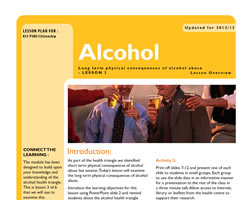PSHE Lesson Plans / KS4 - Alcohol Lesson Plans - 6 Lessons
KS4 - Alcohol Lesson Plans - 6 Lessons
It is important to teach students about the effects of alcohol – however, for a teacher the subject can be a tricky topic to teach. That is why we have developed six comprehensive lesson plans that focus on key alcohol-related topics. Each lesson plan tackles a topic in a sensitive, fun and informative way and also includes well-designed individual and group activities to further enhance the teaching of the topic.
Download these Alcohol lesson plans today and ensure that you effectively deliver to students on the subject of alcohol in a clear and straightforward manner.

Why Study Alcohol? This is can be an awkward question for teachers to answer but with this comprehensive lesson plan answering this question is made easier.
-
 TRS PSHE Alcohol Lesson 1 PDF
TRS PSHE Alcohol Lesson 1 PDF
-
 TRS PSHE Alcohol Lesson 1 PPT
TRS PSHE Alcohol Lesson 1 PPT

The Binge Drinking lesson plan provides your students with a thought-provoking lesson whereby they are introduced to the effects of binge drinking.
-
 TRS PSHE Alcohol Lesson 5 PDF
TRS PSHE Alcohol Lesson 5 PDF
-
 TRS PSHE Alcohol Lesson 5 PPT
TRS PSHE Alcohol Lesson 5 PPT

It is essential to teach students about the effects of alcohol and that is why we have developed this lesson plan as it teaches them specifically about the short-term consequences of alcohol consumption.
-
 TRS PSHE Alcohol Lesson 2 PDF
TRS PSHE Alcohol Lesson 2 PDF
-
 TRS PSHE Alcohol Lesson 2 PPT
TRS PSHE Alcohol Lesson 2 PPT

In the previous lesson the short-term effects of alcohol abuse were highlighted and in this subsequent lesson the issue of long-term alcohol abuse is looked at.
-
 TRS PSHE Alcohol Lesson 3 PDF
TRS PSHE Alcohol Lesson 3 PDF
-
 TRS PSHE Alcohol Lesson 3 PPT
TRS PSHE Alcohol Lesson 3 PPT

The relationship of alcohol and mental health is a topic that is often not clearly discussed with students. It is important for self-development that they gain an appreciation of this problem.
-
 TRS PSHE Alcohol Lesson 4 PDF
TRS PSHE Alcohol Lesson 4 PDF
-
 TRS PSHE Alcohol Lesson 4 PPT
TRS PSHE Alcohol Lesson 4 PPT

Throughout the teaching of the curriculum subject area of Alcohol the aim has been to teach students about the dangers of drinking excessively.
-
 TRS PSHE Alcohol Lesson 6 PDF
TRS PSHE Alcohol Lesson 6 PDF
-
 TRS PSHE Alcohol Lesson 6 PPT
TRS PSHE Alcohol Lesson 6 PPT
Summary of the Alcohol Lesson Plans for PSHE
As a teacher you will need to teach students about the effects of alcohol and convey to them the importance of learning about such a topic. Many students are unaware of the harms of under-age drinking and the damage it can do to their bodies as well as on society, so as a teacher you need to effectively educate them about this.
Lesson Plan 1 – Why Study Alcohol?
The first lesson looks at why students should study the subject of alcohol. It talks about alcohol and how it is the most widely used legitimate drug available in society and then examines the effects that alcohol can have on your health by highlighting the health triangle concept. The lesson focuses on a teacher-led discussion to engage students.
Lesson Plan 2 – Short-term Consequences
This lesson aims to follow-on seamlessly for the first lesson and focuses on getting students to think in more depth about the health triangle concept. The lesson highlights the effects of the short-term consequences of drinking alcohol and provides students with a greater appreciation of alcohol abuse. The lesson plans includes four activities which hope to show students the physical feeling of being drunk as well teaching them about hangovers.
Lesson Plan 3 – Long-term Consequences
The health triangle is further analysed in this lesson as the long-term consequences of drinking alcohol is discussed with students. The lesson looks seriously about the dangers of long-term alcohol abuse on the body as well as examining the subject of alcoholism. The lesson looks at real-life celebrities to highlight alcoholism and provide reference to the discussions.
Lesson Plan 4 – Alcohol and Mental Health
The Alcohol and Mental Health lesson covers the area of how alcohol can affect your mental health by looking at a case study. The exercise aims to show students how alcohol can affect not only your mental health but also how drinking affects your family. The lesson includes a group activity where students can share their feelings as well as a teacher-led discussion that ensures students fully understand the topic.
Lesson Plan 5 – Binge Drinking
In this lesson students will understand what binge drinking is and how binge drinking has a social cost as well as a physical one. The lesson includes a number of activities to engage students including a paired activity where students are encouraged to think about the economic costs of alcohol abuse on society.
Lesson Plan 6 – Final Session
In this final session on the subject of alcohol the health triangle is looked at from the angle of the Government and how and why the Government needs to reduce the social costs of alcohol abuse. This is specifically looked at in relation to young people. This final session also gives teachers the opportunity to reflect on the whole subject and the previous lessons that were covered.

